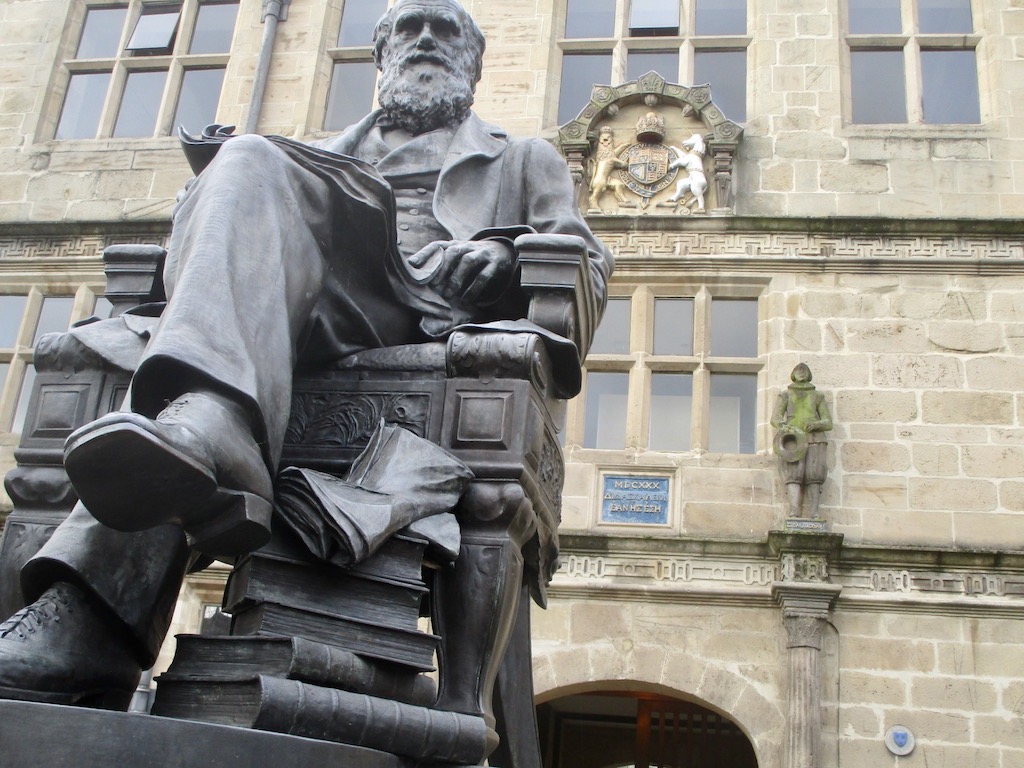He is one of our brightest scientific minds.
His hometown of Shrewsbury marks his birthday on February 12 each year by hosting an international festival of natural sciences. And his 1859 book, On the Origin of Species, forms the basis of our understanding of evolution.
But the naturalist Charles Darwin [pictured above] embarked upon his lifelong quest for knowledge as a small boy in the Shropshire market town and often drew on experiences from his great-outdoors childhood in his later writing.
Walking tour
I’ve come to Shrewsbury, with its half-timbered buildings and historic English Bridge, to join a walking tour in the footsteps of the town’s most famous son.
Down House, Darwin’s Kent home since 1842 may be better known, but the lesser-visited childhood haunts reveal a more human side to the man behind the black-and-white photographs of the stern Victorian scientist.
“Darwin’s ideas were revolutionary on a global scale,” says DarwIN Shrewsbury Festival Organiser, Jon King, “but Shrewsbury is where they were formed.”
The tour starts at the Arts and Crafts-era Morris Hall, the public meeting space with the granite Bellstone in the courtyard a symbol of the unique geology of Shropshire.
Darwin was born in 1809 at Mount House, on the fringe of the town’s Quarry Park, and was loved exploring these geological features in the fields behind his house as a boy.
We move onto St Chad’s Church, where Darwin was baptised, and stroll past the town’s historic Market Hall to the Unitarian Church he attended with his mother, Susannah, whose father was Josiah Wedgwood of the pottery empire fame.
Charles had been born into a well-to-do family, his father, Robert, a respected local doctor, and boarded at Shrewsbury School from 1818, the former school building now converted into the town’s library, while the modern-day school has relocated across town to the banks of the River Severn.
The small square in front of the original school building is today home to a statue of Darwin but, as my tour guide Jon points out, he sits with his back to the school entrance, having not enjoyed the drab rote-learning of his schooldays.
Indeed, his teachers at the time branded him “an average student”.
Golden opportunity
Darwin later attended university in Edinburgh and went on to Cambridge, but he rebelled against his father’s wishes for him to train as a doctor or a clergyman.
He preferred to indulge his passion for natural history by studying earthworms and barnacles amongst others on a series of study tours.
It was only when he was offered a place on an expedition ship, The Beagle, in 1831, the chance came for him to prove himself.
Standing outside the Lion Hotel today, we can still imagine the young Charles rushing to take the next stagecoach to plead for his place on the expedition at The Admiralty in London.
The unpaid role as the resident naturalist on the five-year voyage would change the course of history when the ship sailed from Plymouth on December 27 with Captain Robert FitzRoy at the helm.
We finish the walk under Darwin’s Gate, a public art installation with three seemingly free-standing columns symbolising the three key influences of his formative years, namely the local geology, his religious views and his early study of scientific classification.
Childhood memories
“Darwin attracted more criticism than any other scientist, but he simply saw life with more clarity than most of us,” says Jon. “He was an early pioneer of the stewardship of nature, not control — ideas that still resonate today.”
Darwin died in 1882, and was buried in Westminster Abbey, but remained a Shropshire lad at heart. Indeed, the poetic closing words from On the Origin of Species, could have been written about his Shrewsbury upbringing:
“From so simple a beginning, endless forms most beautiful and most wonderful have been, and are being, evolved.”
More information here.
Read the edited version of this story, A Glorious Evolution, in the Daily Mail.
